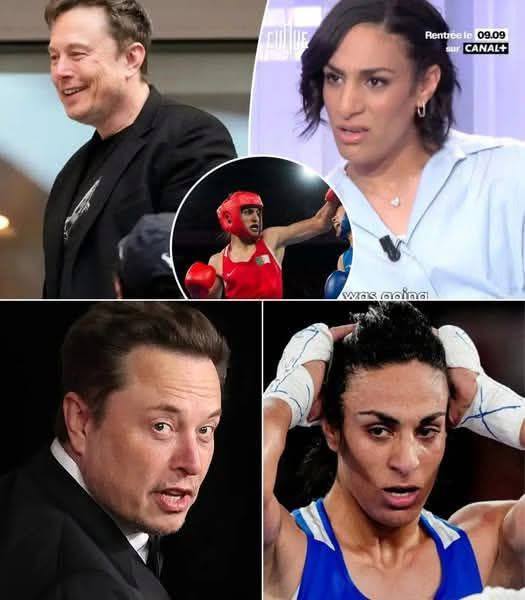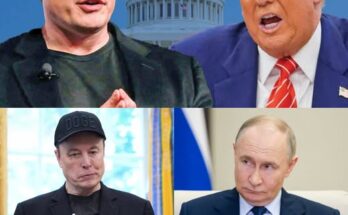Elon Musk, the renowned entrepreneur, tech innovator, and CEO of companies like Tesla and SpaceX, has stirred controversy and sparked a nationwide debate with his recent comments urging a boycott of male athletes participating in women’s sports. The tech magnate, known for his outspoken views on various issues, has entered the contentious realm of gender and sports, calling for not only a boycott of male athletes competing in women’s events but also demanding strict penalties for those who cheat or otherwise exploit gender categories in athletic competitions.

The Context of Elon Musk’s Statement
Musk’s comments came at a time when the issue of transgender athletes competing in women’s sports has become a major topic of debate in the United States and beyond. As transgender rights and the concept of gender fluidity have gained significant traction, many sports organizations, including the International Olympic Committee (IOC) and NCAA, have been forced to reevaluate their policies surrounding gender classification. Some argue that male athletes who transition to female should be allowed to compete in women’s sports, citing the principles of equality and inclusivity. Others, however, contend that biological males retain inherent physical advantages, which might place cisgender women at a competitive disadvantage.
This divide has sparked intense conversations about fairness, equity, and safety within women’s sports. Musk’s intervention into this issue, however, has been seen by many as a direct challenge to current policies and an attempt to influence the public’s perception of transgender athletes in women’s competitions.
The Boycott Call
Elon Musk’s call for a boycott of male athletes participating in women’s sports is not just a casual remark but rather a pointed critique of what he perceives as unfair practices. In his view, allowing biologically male athletes to compete in women’s competitions under the guise of gender identity is a violation of fairness and integrity within the sporting world.
Musk argues that male athletes who transition into women’s categories have physical advantages due to their larger size, muscle mass, and natural testosterone levels, even after undergoing hormone replacement therapy (HRT). While some studies have shown that HRT can reduce certain performance advantages, Musk and others argue that the physical differences, especially in terms of muscle strength, bone density, and cardiovascular fitness, cannot be fully negated by hormone treatment alone. As a result, Musk believes that male athletes participating in women’s sports fundamentally undermines the principle of fairness in athletic competition.
While some might see Musk’s call as a challenge to progressive policies, it can also be interpreted as a plea for a more nuanced conversation about the intersection of gender, fairness, and athleticism. By urging a boycott, Musk seeks to create a shift in the way society views this issue, hoping to protect women’s sports from what he sees as an unfair disruption.
The Demand for Strict Penalties for Cheating
In addition to calling for a boycott, Musk has also advocated for strict penalties for those who attempt to cheat the system, which he perceives as increasingly vulnerable to exploitation. The issue of cheating in sports is nothing new. Athletes have been caught using performance-enhancing drugs (PEDs) for decades, and the debate around what constitutes cheating in the context of gender is now emerging as a new frontier.
Musk has indicated that, in his view, allowing male athletes to compete in women’s sports could be seen as a form of cheating, as it undermines the level playing field that sports are supposed to uphold. This demand for strict penalties has resonated with many who feel that the integrity of sports is at stake. For Musk, these penalties would need to be harsh and clear, sending a message that cheating—whether through physical advantage or other means—will not be tolerated in any form.
Musk’s call for penalties may not be universally accepted, but it underscores his belief that fairness and equity should be central principles in competitive sports. Some see this as an overreach, while others agree with the need for more accountability in how sports organizations handle the participation of transgender athletes. This could include the implementation of stricter guidelines, more rigorous testing, and even the establishment of separate competitions for transgender athletes to maintain fairness.
The Impact on Public Opinion
Musk’s call for a boycott and strict penalties has drawn mixed reactions from the public. Supporters of his stance argue that he is taking a bold and necessary stand to preserve the integrity of women’s sports. They point to instances where transgender women, having transitioned from male to female, have outperformed cisgender women in various athletic events, particularly in strength-based sports like weightlifting and track and field.
Critics, however, view Musk’s comments as transphobic and dismissive of transgender individuals’ rights to participate in sports. They argue that his views ignore the complexities of gender identity and the experiences of transgender athletes, who often face significant barriers to competing in sports to begin with. Many believe that Musk’s remarks only serve to deepen the divide in society and undermine the progress made in terms of inclusivity and equality for transgender people.
The debate surrounding Musk’s statements is further complicated by the fact that he is a high-profile figure with a massive following on social media. His words have the potential to influence public opinion, sway policy decisions, and affect the future of women’s sports. However, the backlash Musk has faced from advocacy groups and the LGBTQ+ community indicates that his position may alienate many who would otherwise have supported him in other areas of his business ventures.
The Future of Women’s Sports
Musk’s comments have ignited a broader conversation about the future of women’s sports and how it should evolve in response to the growing visibility of transgender athletes. It’s a topic that doesn’t have easy answers, as the balance between inclusivity, fairness, and competition is delicate.
Sports organizations and governing bodies will likely continue to grapple with these issues for years to come. For some, creating separate categories for transgender athletes is a possible solution to maintain fairness in competition. Others believe that the existing frameworks for gender classification should be reexamined to ensure that all athletes, regardless of their gender identity, are given a fair and equal opportunity to compete.
As this debate plays out, Musk’s comments will undoubtedly continue to fuel the discussion. Whether his call for a boycott will lead to tangible change or further deepen societal divisions remains to be seen. What is clear is that Musk’s intervention has added yet another layer of complexity to an already divisive issue.
Conclusion
Elon Musk’s call for a boycott of male athletes in women’s sports and his demand for strict penalties for cheating has opened up a new chapter in the ongoing debate surrounding gender and athletics. His stance is grounded in a desire to protect the fairness and integrity of competitive sports, but it has sparked significant controversy and drawn sharp criticism from many corners. As the conversation surrounding transgender athletes and women’s sports evolves, Musk’s views will continue to shape the public discourse. However, whether they will ultimately lead to changes in policy or simply serve as a provocative statement remains uncertain. One thing is clear: the debate over gender in sports is far from over, and figures like Musk will undoubtedly play a role in how it unfolds.
4o mini


